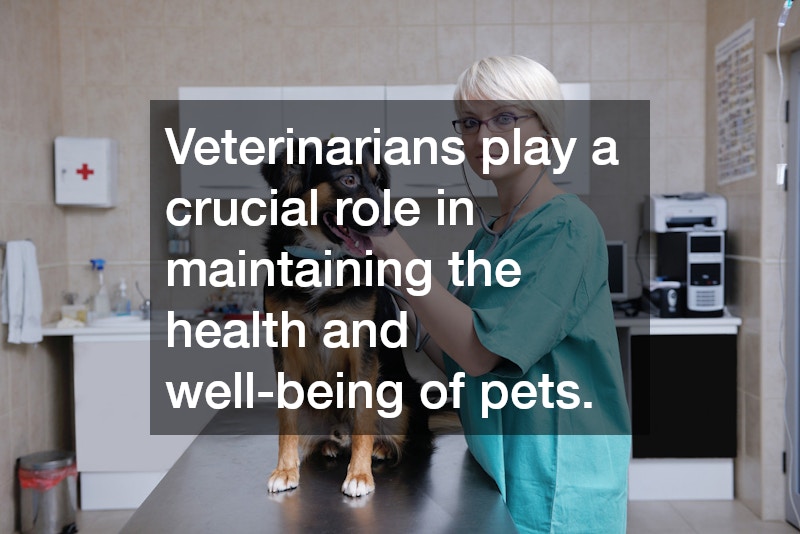
Explore the vital role veterinarians play in ensuring pets’ health and well-being throughout the year. This article addresses common concerns and outlines the various ways veterinarians contribute to pet care beyond just medical emergencies and illness treatment.
Why are Regular Check-Ups Important for Pets?
Early Detection and Prevention
Regular check-ups are crucial as they allow veterinarians to detect and address potential health concerns before they become significant issues. Early detection is key for preventing diseases, ensuring pets can live longer and healthier lives.
Veterinarians perform comprehensive examinations to assess various aspects of a pet’s health, such as dental condition, heart function, and skin health. By catching abnormalities early, pet owners can save on future medical costs and avoid the stress of treating advanced illnesses.
Statistics show that pets with regular veterinary visits experience fewer severe health problems. This preventative approach can lead to better quality of life and increased longevity for pets.
Customized Health Plans
An individualized health plan is critical in addressing the specific needs of each pet. Veterinarians tailor these plans based on factors like age, breed, lifestyle, and pre-existing conditions.
For instance, senior pets may require more frequent check-ups, while active breeds might need particular attention to joint health. Personalized plans can include recommendations for diet, exercise, and routine screenings specific to your pet’s needs.
Customized health management enables pet owners to proactively care for their animals in alignment with veterinary advice. This bespoke approach helps manage existing health issues and fosters overall wellness.
What Vaccinations Does My Pet Need?
Core Vaccines
Core vaccines are essential for all pets as they protect against life-threatening diseases. Vaccinations guard not only individual pets but contribute to broader public health by preventing outbreaks.
Rabies, distemper, and parvovirus are examples of core vaccines that all pets should receive. These vaccines establish a defensive line against prevalent and potentially fatal conditions.
Ensuring that pets receive core vaccines is a fundamental responsibility of pet ownership. By maintaining current vaccinations, pet owners fulfill their duty to keep both their pets and the community safe.
Non-Core or Lifestyle Vaccines
Non-core vaccines are tailored to a pet’s specific circumstances, such as environment and lifestyle. These vaccines address diseases that a pet may be exposed to based on its activities and living conditions.
For example, dogs that frequently swim might benefit from a leptospirosis vaccine. Similarly, pets traveling to areas with higher disease prevalence may require additional vaccinations.
Veterinarians can help pet owners decide which lifestyle vaccines are necessary. This ensures a pet’s health is managed with attention to individual risks and exposures.
How Do Vets Support Nutrition and Diet for Pets?
Dietary Assessments
Veterinarians play a significant role in evaluating pet diets to ensure they meet their nutritional needs. They analyze factors such as age, weight, and activity levels to make precise dietary recommendations.
Pets require balanced diets comprising essential nutrients for growth, maintenance, and energy. Regular dietary assessments help address nutritional deficiencies and promote better health outcomes.
Global studies have shown that pets who receive tailored diets from veterinary consultations show improved vitality. This underlines the importance of maintaining appropriate nutrition as part of routine pet care.
Special Diets and Supplements
In specific cases, veterinarians recommend special diets to manage conditions like obesity, kidney disease, or allergies. Such dietary adjustments have proven beneficial in managing conditions effectively.
Supplements may be advised to support joint health or enhance nutrition when certain dietary elements are lacking. These interventions help maintain pets’ well-being alongside their primary diet.
A strategic dietary plan that includes special diets or supplements, as advised by a vet, can significantly improve a pet’s quality of life. Supplementation strategies are individually tailored to avoid potential nutrient excesses or deficiencies.
Veterinarians play a crucial role in maintaining the health and well-being of pets throughout the year. Their expertise in regular check-ups, vaccination protocols, and nutritional guidance is indispensable to pet health.
By focusing on prevention, personalized care plans, and appropriate vaccination and nutrition strategies, veterinarians help ensure pets live longer, healthier lives. Regular veterinary guidance and care keep pets feeling their best and contribute to their holistic well-being.
Beyond medical treatments, veterinarians also serve as trusted advisors for pet owners, offering valuable insight into behavioral concerns, exercise routines, and age-specific needs. This level of comprehensive support makes it easier for pet owners to navigate the challenges of raising and caring for pets at every stage of life. Whether it’s addressing unexpected health issues, providing emergency care, or supporting long-term wellness goals, veterinarians are partners in creating a healthier, more fulfilling life for pets.
Investing in consistent veterinary care not only improves quality of life but can also prevent costly interventions down the line. When pet owners establish strong, ongoing relationships with their veterinarians, they gain peace of mind knowing their beloved companions are receiving the attention, care, and expertise they truly deserve.


